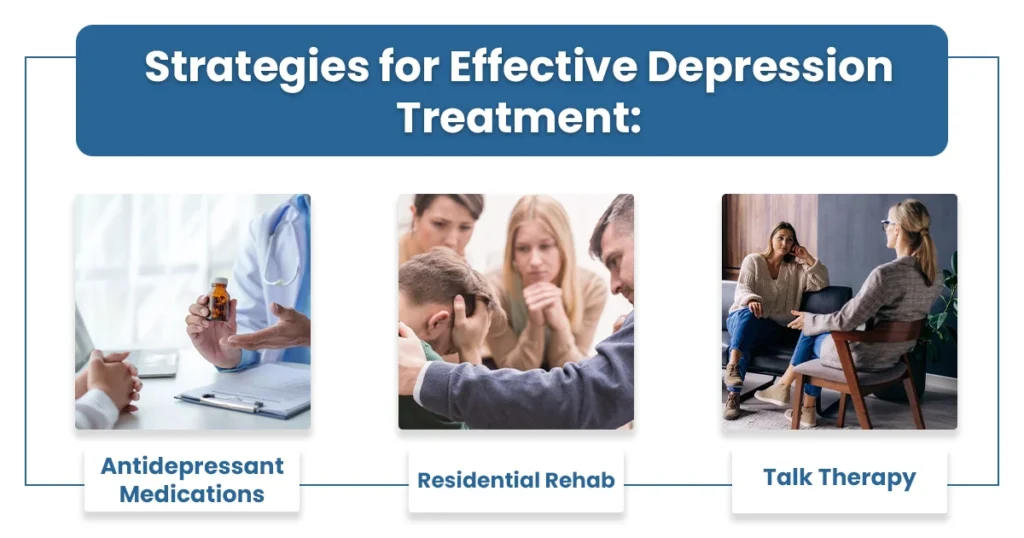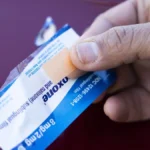Depression, a common mental health concern, can affect anyone, impacting their well-being and daily life. It encompasses various forms, such as major depressive disorder, seasonal affective disorder, and severe depression.
Linked to both life events and chronic pain, depression extends beyond a temporary mood swing. Understanding these facets is critical to addressing and supporting patients during mental health treatment.

Key Takeaways
Depression affects feelings, thoughts, and daily life, impacting well-being and requiring practical support. Here’s what you need to know:
- Depression is an umbrella term for various disorders, including major depressive disorder, seasonal affective disorder, and severe depression.
- Recognizing symptoms is crucial, as depression often stems from underlying mental health conditions.
- Prevention involves maintaining physical health, building strong connections, understanding substance use, and seeking professional guidance proactively.
If you or your loved one is dealing with depression, call The Haven Detox-Little Rock at (501) 271-3342 today.
A Closer Look at Depression
Depression, a common mental disorder in the United States, involves changes in brain chemistry. The brain’s nerve cells, crucial for daily activities, are impacted, emphasizing the need for medical help.
It is vital to understand the mind-body connection to practice strategies that can aid in overcoming depression. Healthcare providers consider family history and lifestyle changes to provide support.
Classifying Types of Depression
Depression has various subtypes, impacting people of all ages. Understanding these types sheds light on the diverse ways depression can affect individuals.
Major Depressive Disorder (MDD)
Major Depressive Disorder (MDD) influences mood, behavior, and personality traits. It often stems from a family history of depression or chemical imbalances in the brain’s neurotransmitters.
Recognizing signs, such as physical symptoms and suicidal thoughts, is crucial for timely intervention. Drugs like selective serotonin reuptake inhibitors may help, but understanding the exact cause remains challenging. MDD can impact people of all ages, including children, impacting their daily activities and relationships.
Seasonal Affective Disorder (SAD)
Seasonal Affective Disorder (SAD) ties mood shifts to seasonal changes, particularly in winter. Its origins include genetic factors and reduced sunlight exposure, affecting neurons in the brain. Individuals may experience symptoms like fatigue and changes in sleep patterns. Addressing SAD involves light therapy and, in severe cases, medication.
Persistent Depressive Disorder (PDD)
PDD brings prolonged depressive symptoms, lasting for years. Influenced by both genetic and environmental factors, it often coexists with anxiety disorders. Identifying and managing symptoms, such as low energy and feelings of hopelessness, is vital for improving quality of life.
Bipolar Disorder
Bipolar disorder involves extreme mood swings between highs (mania) and lows (depression). Episodes may be triggered by life events or substance use. Managing this condition requires a combination of medications and therapy to stabilize mood fluctuations.
Postpartum Depression
Postpartum Depression affects new mothers, impacting their well-being and parenting. Hormonal changes, coupled with stress and sleep deprivation, contribute to its onset.
Recognizing signs, including changes in appetite, stress, and lack of interest in daily activities. Treatment may involve therapy, medication, or a combination to help mothers navigate this challenging period.
Causes and Triggers of Depression
Understanding depression involves exploring various factors that contribute to its onset. These factors can be broadly categorized into biological, psychological, emotional, and environmental elements.
Biological Factors
Biological risk factors involve aspects related to the body and brain. A chemical imbalance in neurotransmitters, the brain’s messengers, can affect mood. Genetic predisposition, passed down through families, may also contribute to a person’s vulnerability to depression. Hormonal changes, like those occurring during puberty or postpartum, can impact emotions and trigger depressive symptoms. Adopting healthy habits can assist in improving mental health and stabilizing your lifestyle.
Psychological Factors
Psychological factors are how our minds work, think, and understand things. Certain personality traits can make someone more likely to feel depressed. So, our thoughts, personality, and past experiences all play a part in how we feel emotionally.
Emotional Factors
Emotional factors focus on the feelings and reactions that shape mental well-being. Persistent feelings of sadness, grief, or loneliness can escalate into depression. Coping with intense emotions, like anger or frustration, may also play a role in triggering depressive episodes. Emotional resilience and managing stress are crucial aspects of mental health.
Environmental Factors
Environmental factors encompass the external influences that surround individuals. Life events, such as the loss of a loved one, financial difficulties, or relationship challenges, can significantly impact mental health. Additionally, chronic stressors, like a demanding job or unstable living conditions, contribute to the risk of depression. Substance abuse, including alcohol or drug use, further complicates the picture.
How to Identify Symptoms of Depression
Depression shows up in many ways, impacting how people feel, think, and go about their days. Knowing these signs early on is vital for good support. Let’s look at three crucial areas of symptoms:
Emotional Symptoms
Depression deeply affects feelings. People might feel sad, hopeless, or empty without genuine reason. Doing things they used to enjoy becomes complicated, and they might get easily upset or sensitive to criticism. Recognizing these emotional changes helps find possible depressive episodes early, making it easier to help.
Cognitive Symptoms
Depression messes with thinking, making it hard to concentrate and affecting decision-making and memory. Negative thoughts about oneself, often with self-criticism, can take over daily life, affecting work, relationships, and overall happiness. Spotting these changes in thinking is vital for understanding and dealing with the impact of depression.
Physical Symptoms
Depression isn’t just about feelings and thoughts; it also affects the body. Irregularity in appetite and weight, trouble sleeping or sleeping too much, feeling tired all the time, and unexplained aches or pains are common physical signs of depression.
Recognizing these bodily changes is crucial for fully understanding depression. It’s also essential to think about physical illnesses as they might be linked to or caused by depressive symptoms. In addition to these symptoms, signs of depression can include ongoing bad moods and self-harm. Significant life changes or a traumatic event can contribute to the start of depression.
Strategies for Effective Depression Treatment
When dealing with depression, various approaches are available, and healthcare providers play a crucial role in determining the most effective treatment. Let’s explore three standard methods:
Antidepressant Medications
Health professionals may prescribe antidepressant medications to help balance brain chemicals that influence mood. These medications are not a single solution, and the exact cause of depression varies among individuals. While they can be beneficial, being aware of potential side effects is essential. Regular check-ins with health care providers are crucial to monitor vital signs and adjust treatment as needed.
Residential Rehab
Residential rehab for mental health is like a safe and structured space for people facing mental health issues. People stay there for a few weeks to a few months. The main aim is to give intense therapy in a helpful environment.
These places use different methods, like talk therapy sessions alone or in groups, teaching about mental illnesses, and activities that give patients a positive perception of life. This way, it feels like a community, and people can fully concentrate on improving without regular life disruptions. It’s a supportive place where professionals guide individuals to understand and improve their mental health.
Talk Therapy
Talk therapy, specifically cognitive behavioral therapy, is another valuable approach to treating depression. Cognitive-behavioral therapy focuses on changing negative thought patterns and behaviors contributing to depression.
Healthcare providers guide individuals in recognizing and altering these patterns, promoting healthier mental processes. Building strong relationships and seeking social support are integral to this therapy, aiding overall well-being.
There isn’t a single cause for depression, and individuals may experience it for different reasons. Recognizing signs of depression and seeking help early on are essential steps to effective treatment.
Tips to Prevent and Manage Depression
When it comes to preventing and managing depression, several activities can improve mental health. Let’s explore four key areas to focus on:
Maintaining Physical Health
Taking care of your physical health is vital. Regular exercise and a balanced diet can influence brain regions that affect mood regulation. Adequate sleep is also crucial, as it contributes to overall well-being. By prioritizing physical health, you create a foundation for better mental health.
Building Strong Connections
Social support plays a significant role in preventing and managing depression. Cultivate strong relationships with friends, family, and others who uplift and understand you.
Open communication and sharing your feelings contribute to better emotional well-being. A supportive network around you acts as a buffer against life’s challenges.
Understanding Substance Use
Be mindful of substance use, as there is a direct relationship between addiction and mental health. Substance use disorder is a serious illness that can impact brain cells and mental health. Seeking help for substance-related concerns and making informed choices about substance use are essential steps in preventing and managing major depression.
Seeking Professional Guidance
If you notice possible causes of depression or experience persistent feelings of sadness, don’t hesitate to seek professional guidance. Healthcare providers can offer a better understanding of your unique situation and recommend suitable interventions. Whether it’s talk therapy or exploring potential causes, professionals can provide tailored support to help prevent and manage depression effectively.
Frequently Asked Questions (FAQ)
Do depressed people have a reason?
Depression can stem from various factors, including genetics, life events, or chemical imbalances in the brain. It’s not always linked to a single apparent reason. While specific triggers may contribute, depression often involves a complex interplay of biological, psychological, and environmental factors. Understanding and addressing these multifaceted causes is essential for effective treatment and support.
What happens in the brain during depression?
In depression, there’s a disruption in the balance of brain chemicals called neurotransmitters, impacting mood regulation. Certain brain regions associated with emotions, like the amygdala and hippocampus, may also be affected. The exact neurological mechanisms are complex and not fully understood, but these changes contribute to the emotional and cognitive symptoms experienced during depression.
What causes clinical depression?
Clinical depression results from a combination of genetic, biological, environmental, and psychological factors. Family history of depression, chemical imbalances in the brain, and stressful life events can contribute.
It’s crucial to recognize that clinical depression isn’t caused by a single factor but rather by a combination of these elements. Seeking professional guidance helps identify specific causes in individual cases, allowing for tailored treatment approaches.
Find Stability in Life with The Haven Detox-Little Rock
Struggling with mental illness can be challenging, impacting not just individuals but also their loved ones. At The Haven Detox-Little Rock, we understand these struggles.
Our comprehensive services are tailored for those seeking mental health treatment, addressing mental illness. Our treatment services go beyond mental health and offer addiction treatment. Our detox program helps you start a sober life. Embrace transformation with our residential rehab, offering an immersive experience focused on your well-being.
We prioritize your journey to lasting recovery, providing the care and support you need. Call us today at (501) 271-3342 for the treatment you deserve.



